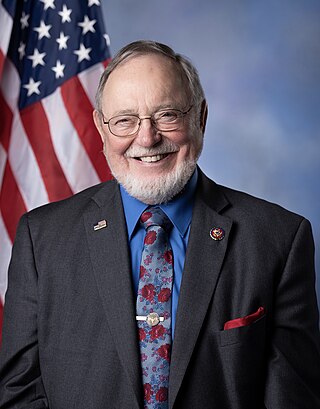Related Research Articles

Donald Edwin Young was an American politician in Alaska. He was the longest-serving Republican in congressional history, having been the U.S. representative for Alaska's at-large congressional district for 49 years, from 1973 until his death in 2022.
KTVA is a television station in Anchorage, Alaska, United States, affiliated with the digital multicast network Rewind TV. The station is owned by Denali Media Holdings, a subsidiary of local cable provider GCI. KTVA's transmitter is located in Spenard—covering the Anchorage bowl and much of the adjacent Matanuska-Susitna Valley.

KTUU-TV is a television station in Anchorage, Alaska, United States, affiliated with NBC. It is owned by Gray Television alongside dual CBS/MyNetworkTV affiliate KAUU. Both stations share studios on East 40th Avenue in midtown Anchorage, while KTUU-TV's transmitter is located in Knik, Alaska.

Jodie Emery is a Canadian cannabis rights activist and politician. She is the spouse of fellow activist Marc Emery. Until the business was shut down by police, the couple were co-owners of Cannabis Culture, a business that franchised pot dispensaries, later deemed to be illegal. They had obtained the cannabis from illegal sources, according to Crown prosecutors. They are the former operators and owners of Cannabis Culture magazine and Pot TV.
The Alaska Public Safety Commissioner dismissal, also known as Troopergate, involves the possibly illegal July 2008 dismissal of the Alaskan Public Safety Commissioner Walt Monegan by Republican Governor Sarah Palin. A complaint alleged that Palin dismissed Monegan because he did not fire Alaskan State Trooper Mike Wooten, who was in a bitter divorce with Palin's sister, Molly McCann.

Joseph Wayne Miller is an American attorney and politician. He is best known as the runner-up in both the 2010 United States Senate election in Alaska and the following 2016 election. A member of the Republican Party, he faced Lisa Murkowski in both races, and has aligned himself with the Libertarian Party and Constitution Party.

Charlotte's Web is a brand of high-cannabidiol (CBD), low-tetrahydrocannabinol (THC) products derived from industrial hemp and marketed as dietary supplements and cosmetics under federal law of the United States. It is produced by Charlotte's Web, Inc. in Colorado. Hemp-derived products do not induce the psychoactive "high" typically associated with recreational marijuana strains that are high in THC. Charlotte's Web hemp-derived products contain less than 0.3% THC.

Initiative 71 was a voter-approved ballot measure in Washington, D.C., that legalized the recreational use of cannabis. The short title of the initiative was "Legalization of Possession of Minimal Amounts of Marijuana for Personal Use Act of 2014". The measure was approved by 64.87% of voters on November 4, 2014 and went into full effect on February 26, 2015.
Alaska Measure 2 was a successful 2014 ballot measure in the U.S. state of Alaska, described as "An Act to tax and regulate the production, sale, and use of marijuana". The measure went into effect on 24 February 2015, allowing Alaskans age 21 and older to possess up to an ounce of cannabis and six plants, making Alaska the third state to legalize recreational marijuana, following Colorado and Washington. Oregon and Alaska both voted in legalization on Election Day 2014, but Alaska preceded Oregon in enacting their legislation.

Cannabis in Alaska is legal for recreational use since 2015. It was first legalized by the court ruling Ravin v. State in 1975, but later recriminalized by Measure 2 in 1990. Ballot measures in 2000 and 2004 attempted to legalize recreational use, until finally Measure 2 in 2014 passed with 53.2% of the vote. Medical use was legalized by way of Measure 8 in 1998.

Cannabis dispensaries in the United States or marijuana dispensaries are a local government regulated physical location, typically inside a retail storefront or office building, in which a person can purchase cannabis and cannabis related items for medical or recreational use. First modeled in Amsterdam in the late 1970s where they were innocently called coffee shops, it would take the Americans more than a generation to successfully duplicate the idea of a retail cannabis storefront. Unlike in the Dutch coffee shops, today dispensary customers are prevented from consuming cannabis on the site of a regulated dispensary in all known markets.

Uncle Ike's Pot Shop is an establishment in Seattle, Washington, licensed by the Washington State Liquor and Cannabis Board to sell cannabis to the public. It opened on September 30, 2014 and was the second cannabis retailer in Seattle, after Cannabis City. As of 2016 it led the state of Washington in cannabis retail sales at over $1 million per month. The proprietor is Ian Karl Eisenberg, aka "Uncle Ike". The business is both praised for being the first to inform consumers about pesticides in their product, and criticized for contributing to gentrification of the neighborhood it is located in, Seattle's Central District. When it opened, the shop was said to be "built like a fortress" with security provided by a company owned and staffed by ex-military service members. As of 2022, Uncle Ike's has expanded to five shops in Seattle, including a outlet store in the White Center neighborhood.

The use of cannabis as a recreational drug has been outlawed in many countries for several decades. As a result of long-fought legalization efforts, several countries such as Uruguay and Canada, as well as several states in the US, have legalized the production, sale, possession, and recreational and/or medical usage of cannabis. The broad legalization of cannabis in this fashion can have numerous effects on the economy and society in which it is legalized.
Rachel K. Gillette is an American attorney who specializes in law relating to marijuana and the cannabis industry. Gillette is based in Lafayette, Colorado. As a lawyer, she is licensed to practice law in Colorado and Connecticut.
Alan Gertner is a Canadian. He is the co-founder and CEO of Tokyo Smoke, a Canadian lifestyle brand that focuses on coffee, clothing and legal cannabis. Gertner who also co-founded Hiku, a Canadian company, is a former Google executive known for his work in the Canadian cannabis industry.
To frame the lists below, here is an overview of women in the industry since as early as 2012 in the U.S. Cannabis has a long legal history in the U.S. from criminalization to liberalization given the emerging markets of legalizing medicinal and recreational use of cannabis. Women and issues relating to gender bias or sexism vs. gender equality and inclusion have played a significant role in various sectors of emerging markets, particularly in Colorado, California, and Oregon.
References
- 1 2 "Charlo Greene (profile)". WOKTV (archived). Archived from the original on May 5, 2013. Retrieved 6 October 2014.
- 1 2 "Charlo Greene (profile)". KTVA. Archived from the original on August 30, 2014. Retrieved 6 October 2014.
- 1 2 Maxwell, Zach (2014-09-22). "Delusional, self centered, Alaskan anchor who quit her job on-air attended UTA". The Arlington Voice. Archived from the original on 2014-10-06.
- 1 2 3 4 Fox, Hayley (2017-03-11). "Infamous 'Fuck it, I Quit' Reporter Launches Online Weed Show in L.A." LA Weekly. Retrieved 2017-06-04.
- ↑ "Charlo Greene KTVA Bio, Wiki, Age, Family, On-Air Resignation and Net Worth". Yankee Tv Journalists, Reporters and News Anchors. 2019-05-29. Retrieved 2022-03-16.
- ↑ Pallotta, Frank (22 September 2014). "Alaska reporter: 'F*** it, I quit'". CNN. Retrieved 6 October 2014.
- ↑ HOOTON, CHRISTOPHER (23 September 2014). "'F*ck it, I quit': KTVA reporter Charlo Greene quits live on air in spectacular fashion". Independent. Retrieved 6 October 2014.
- 1 2 Romano, Andrea (September 28, 2014). "The 'F*ck It' Reporter Talks Weed, Snoop Dogg and Going Viral". Mashable. Retrieved 6 October 2014.
- ↑ "Up In Smoke! Alaskan Reporter Charlo Greene Profanely Quits On The Air, With Ulterior Motive In Mind". Radar Online. 22 September 2014. Retrieved 6 October 2014.
- ↑ Gould, Emily (23 September 2014). "Quitting your job in public feels great. Until you don't get another one". The Guardian. Retrieved 6 October 2014.
- ↑ https://www.independent.co.uk/news/world/americas/meet-the-us-news-reporter-who-quit-her-job-live-on-air-to-campaign-for-cannabis-legalisation-in-alaska-9833611.html
- ↑ NATHAN GERSON, MERISSA (9 October 2014). "THE 13 MOST POTENT WOMEN IN THE POT INDUSTRY". Elle. Retrieved 11 October 2014.
- ↑ Greene, Charlo. "Alaska Cannabis Club's freedom & fairness fight". IndieGoGo. Retrieved 6 October 2014.
- ↑ "Brunch, Beauty & Business w/ Charlo "Koko" Greene - YouTube". YouTube .
- ↑ Caldwell, Suzanna (2014-11-13). "APOC, marijuana activist Charlo Greene clash over campaign disclosure questions". Alaska Dispatch Laws. Retrieved 2014-12-20.
- ↑ Caldwell, Suzanna. "APOC: Marijuana activist Greene must comply with subpoena". Alaska Dispatch News. Retrieved 2014-12-20.
- ↑ "Charlo Greene, Alaska television reporter and pot activist, investigated". The Grio. 2014-11-29. Retrieved 2014-12-20.
- ↑ Klint, Chris. "Charlo Greene evicted from Anchorage cannabis 'clubhouse'". KTUU. Archived from the original on 28 January 2015. Retrieved 24 January 2015.
- ↑ "Cops Raid Pot Club Owned by Charlo Greene, Reporter Who Quit on Air". NBC News. Retrieved 2016-10-25.
- ↑ Levin, Sam (2016-09-29). "Reporter who quit on air to fight for pot legalization faces decades in prison". The Guardian. ISSN 0261-3077 . Retrieved 2016-10-24.
- ↑ Andrews, Laurel (2018-09-12). "Charlo Greene enters plea deal on 2015 marijuana charges". Anchorage Daily News. Retrieved 2018-10-09.